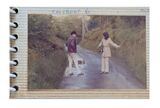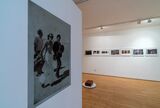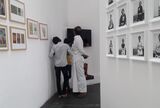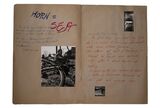El Otoño
A civic-military coup led by General Augusto Pinochet seized control of Chile on 11 September 1973, abruptly ending Salvador Allende’s “Chilean Road to Socialism.” The Pinochet regime began an extensive terror campaign against leftists and former supporters of Allende. Dreams of a more egalitarian society ended on that day. Economic violence echoed widespread state brutality including kidnapping, arbitrary arrests, torture, executions, and enforced disappearances. Exiles who managed to escape maintained the dream of Allende’s short-lived socialist experiment. My own experience as a next-generation exile nurtured a certain longing for Chile in me. During a trip to Chile in 2006, Augusto Pinochet died weeks after I arrived, resonating with Gabriel Garcia Márquez’s The Autumn of the Patriarch – El Otoño del patriarca (1986), a novel which narrates the life and death of an eternal dictator.
Material presented in this exhibition belongs in the interstitial space of exile. My attempts to understand the complexities of this fractured place and time reflects Julio Cortazar’s seminal 1968 novel Rayuela (Hopscotch), which broke boundaries by activating readers and making them hopscotch through the book, jumping from chapter to chapter. The figures I encountered in Chile, such as the relatives of the disappeared, experience a different liminality, unable to bury and mourn their missing whose fate is still unknown after 30 years after the dictatorship ended. El Otoño attempts to honour the missing, those who stayed, those who left, and those still trying to build a better future.
Sebastián Bustamante-Brauning, 2021
Material presented in this exhibition belongs in the interstitial space of exile. My attempts to understand the complexities of this fractured place and time reflects Julio Cortazar’s seminal 1968 novel Rayuela (Hopscotch), which broke boundaries by activating readers and making them hopscotch through the book, jumping from chapter to chapter. The figures I encountered in Chile, such as the relatives of the disappeared, experience a different liminality, unable to bury and mourn their missing whose fate is still unknown after 30 years after the dictatorship ended. El Otoño attempts to honour the missing, those who stayed, those who left, and those still trying to build a better future.
Sebastián Bustamante-Brauning, 2021












